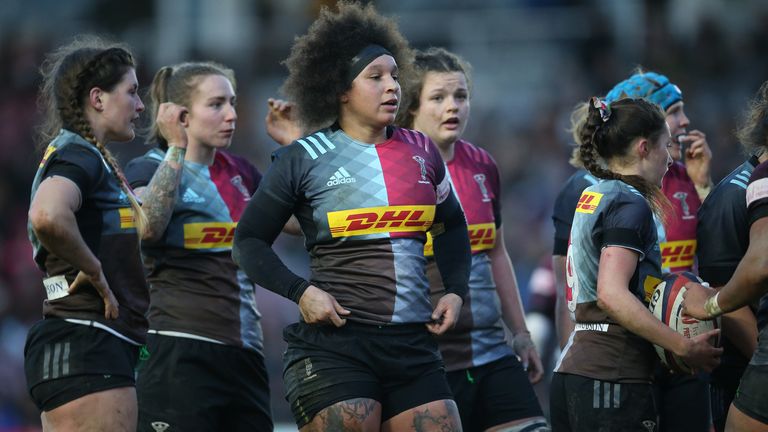DCMS report: Coronavirus cancellations mean women are less likely to play sport
Host cities for 2022 Women's European Championship in England given £1m of National Lottery funding to increase number of adult women playing football
Thursday 23 July 2020 12:50, UK
The cancellation of women's sporting events due to coronavirus means women are less likely to be inspired to play sport and this “risks undoing work to improve funding”, MPs have warned.
In a damning report, the Digital, Culture, Media and Sport Committee (DCMS) has criticised the lack of funding for women's elite sports and urged the Government not to sacrifice women's sport, in favour of prioritising the men's game.
- DCMS report: Up to 15 pro clubs in danger of going bust
- FA approached by private equity firm over WSL stake
The report also found that the COVID-19 crisis has, in some cases, "exacerbated" inequalities between men's and women's sport.
In football, while the Premier League and Championship have been able to return behind closed doors, the Women's Super League (WSL) and Championship seasons were cancelled, with the FA citing a lack of funding as one of the main contributing factors.
The report also highlighted disparities between the cancellation of women's events in rugby and cycling, where men's events have been rearranged for later dates.
Last month, the Premier League announced it has offered around £1m to help fund coronavirus testing and allow the return of the WSL for the 2020-21 season, but the DCMS committee criticised this move for coming "late in the day".
"Over recent years, women's elite sports have been consistently underfunded compared to men's," the report read. "In many cases, the financial models for broadcasting and ownership differ from those in male sports.
"The Covid-19 crisis has highlighted, and in some cases even exacerbated, this inequality. Before the crisis, women's sport accounted for just 4% of sports media coverage in the UK.
"While we acknowledge and welcome the Premier League's "gesture" of giving approximately £1 million to the women's professional football game to assist them with setting up a testing system, the assistance came somewhat late in the day and has not prevented women's competitions being cancelled this season.
"The lack of visibility of women's sport this summer risks undoing work to improve funding for women's elite sport.
"Cancellation of women's events is likely to reduce the number of women being inspired to take part in sporting activities.
"In its response to this report, the Government should outline how it intends to support women's sport post-crisis and ensure that, going forward, men's elite sports are not further prioritised at the expense of the women's game."
Euro 2022 host cities get £1m funding from Sport England
The host cities for the 2022 Women's European Championship in England have been given a total of £1m of National Lottery funding to increase the number of adult women playing football.
London, Trafford, Manchester, Sheffield, Rotherham, Milton Keynes, Wigan and Leigh, Brighton and Hove, and Southampton will all receive around £100,000 from Sport England to "create recreational women's football opportunities".
Sport England's executive director of sport Phil Smith said: "EURO 22 will be a significant and exciting event, and we are delighted to be working with The FA to use it to grow the women's game.
"We believe a 'place-based approach' - working with local stakeholders to develop a recreational football programme for the right place, at the right time - can be instrumental in making this happen and ultimately developing women's and girls' football in England.
"We know from data collected during the 2019 Women's World Cup that there was a significant increase in the number of women playing football both during and after the tournament.
"For EURO 22, Sport England and The FA are trying to get ahead of the game. We know the tournament will excite the fans and the public, so we want to use that excitement to support even more women and girls to start playing."





